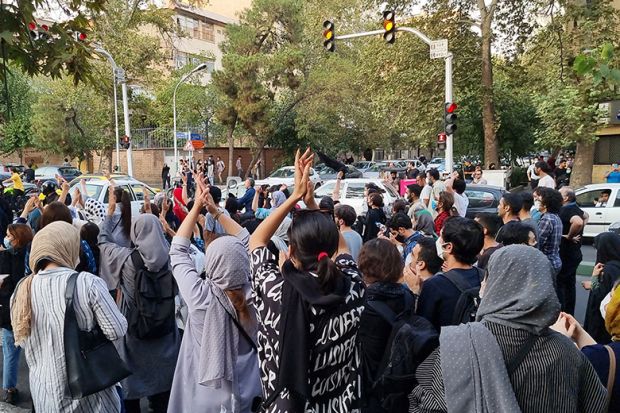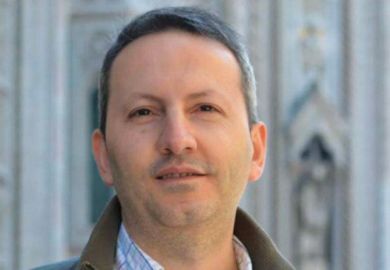As nationwide protests in Iran began their third week, academics predicted the regime would crack down harder on opposition in universities, with more “purges” in store for faculty and students.
More than 200 Iranian universities had gone on strike as of 29 September, the Center for Human Rights in Iran reported, as part of the largest anti-government demonstrations the country had seen since 2009. On social media, participants shared videos of students staging walkouts to demand the release of detained protesters.
Anger has flared since 16 September when a young Iranian woman, Mahsa Amini, died in custody after failing to correctly wear a headdress required by Iran’s “morality police”.
Academics said that, while it was unclear how long protesters would maintain the upper hand, the regime would retaliate against students and faculty at the first opportunity.
Jason Brodsky, policy director of United Against Nuclear Iran, a US-based non-profit organisation, predicted that universities’ vocal opposition to the government would trigger a fresh wave of “firings, expulsions and purifying [of] policies to ensure adherence to the Islamic Republic’s revolutionary ethos”.
He said that for years, the regime has used various bodies – including the Supreme Council of the Cultural Revolution, Iran’s Ministry of Science and its Ministry of Health and Medical Education – to control its education sector.
“While there is no doubt of dissent in the ranks of Iran’s universities and that this will continue to simmer, Tehran will use this labyrinthine system of control over the universities to purge and solidify its hold,” he said.
Afshin Ellian, a Dutch-Iranian professor of law and head of the department of jurisprudence at Leiden University in the Netherlands, agreed. “If the government sees the opportunity, many will be fired,” he said of faculty.
He noted that already, students’ resistance is proving “very threatening for the regime”, as it did during the 1979 Iranian Revolution, which led to the overthrow of Shah Mohammad Reza Pahlavi.
Professor Ellian predicted that opposition would continue to mount for some time before Iran’s Revolutionary Guards could carry out more repressive measures.
“Right now, they have no control over the protesters and the street,” he said. “Every day we see more universities wanting to strike…the key question is whether high schools will also join the strikes in the coming days.”
Mehdi Noorbaksh, professor of international affairs and business at Harrisburg University, said that even if daily life resumes on Iran’s campuses, their role as a key source of opposition to the government will not stop.
“The universities will open, but unrest will continue in different shapes and manners,” he predicted.
He noted that media have reported instances of professors publicly asking for the release of the students or allowing students to abandon required uniform in class – acts of defiance that are not yet widespread but are “gaining momentum”.
Professor Noorbaksh said that while attempts to suppress scholars have seen them lose employment, they have not silenced outspoken critics of the regime “beyond the walls of universities” or lessened their influence on students, noting examples such as philosopher Bijan Abdolkarimi, whose dismissal last year triggered outcry.
Ali Ansari, a professor of history at the University of St Andrews who studies the development of the Iranian state, cautioned that within universities, there are likely to be “divisions of opinion” between academics – who generally support students – and administrators backing the regime.
Still, he agreed that stanching the protests would prove challenging. “At the end of the day, controlling what students will do will be difficult if sufficient numbers are angry,” he said.
Register to continue
Why register?
- Registration is free and only takes a moment
- Once registered, you can read 3 articles a month
- Sign up for our newsletter
Subscribe
Or subscribe for unlimited access to:
- Unlimited access to news, views, insights & reviews
- Digital editions
- Digital access to THE’s university and college rankings analysis
Already registered or a current subscriber?








